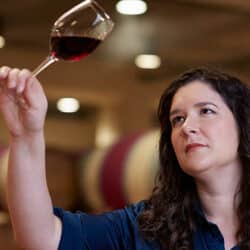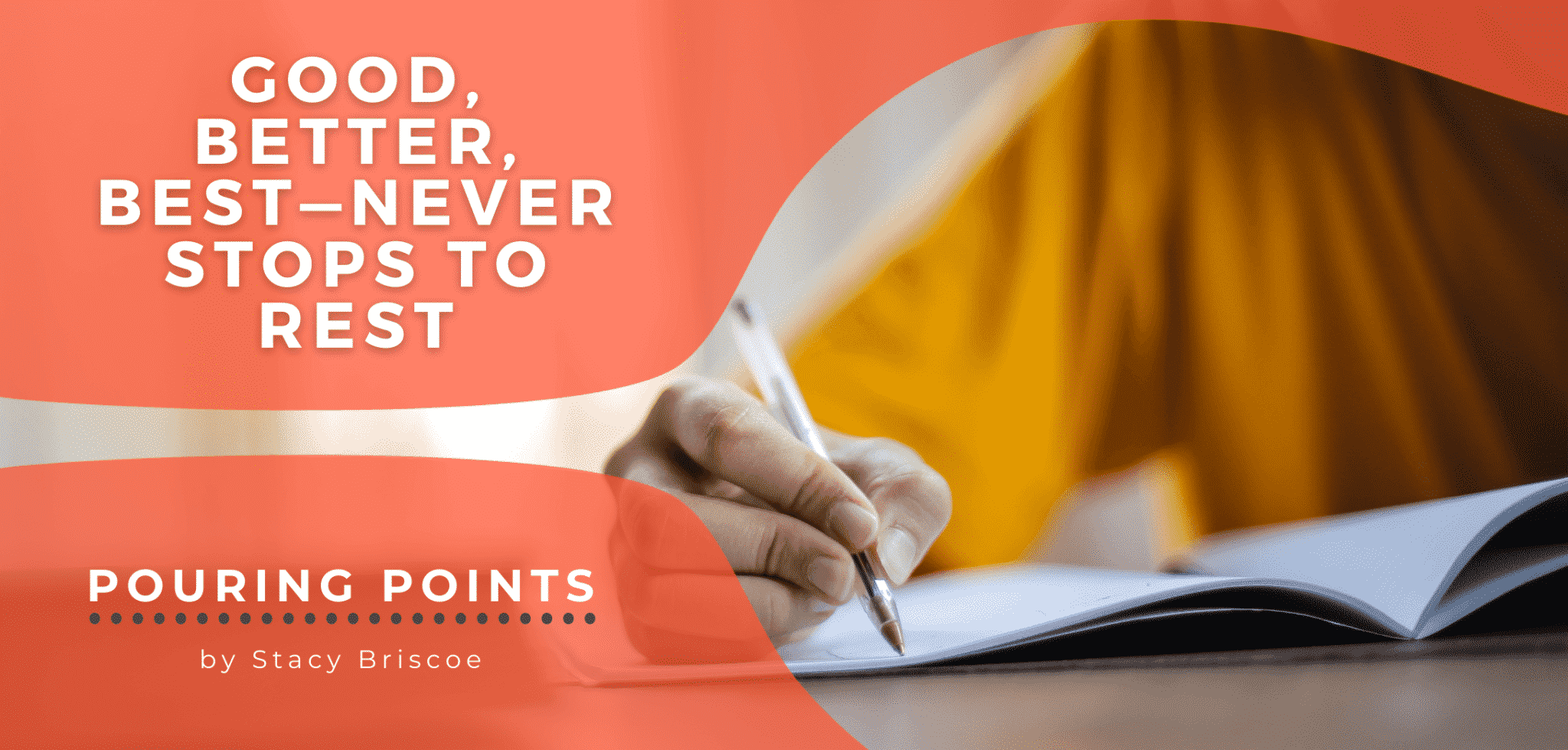Dear fellow wine students,
You are not alone. If you’re feeling “less than impressed” with your exam performance or on the nervous countdown until your next, questioning whether or not you’re good enough, why you’re here, and where you think you’re going in the world of wine—You are not alone.
I’ve been there. I’ve felt alone—felt like I’m the only person who didn’t figure out that wine, that flight, that essay question. Like I’ve spent money and hours studying and now all I can do is stew for 12 weeks thinking of all the ways I went wrong.
After my last exam, I cried. I cried from exhaustion and relief when it was over. I cried realizing how repetitive one of my essay questions turned out. I cried when they revealed the wines: I couldn’t look at a German Riesling—or any Riesling—without a sense of shame. (Is the wine judging me?)
After wiping the tears from my eyes, snot from my nose, and deciding that, no, that bottle of Riesling is not giving me the stink eye, I reached out to my advisors at the Napa Valley Wine Academy who assured me that I am not alone. That especially in wine, mistakes happen to the very best of us.
I passed my D3 exam, both theory, and tasting—with Merit in fact. But what I learned was to make sure I use that scratch piece of paper to craft a solid outline, in order to write more confidently (and less repetitively). What I learned is that—no, you don’t have to call all the wines correctly to receive a high tasting score and that the time I spent learning to write quick, accurate tasting notes and thorough arguments for my conclusions is worth more than knowing which anbaugebiete the Riesling is actually from.
So, this is for you, my downtrodden colleagues. This is the story of the best of us who have stumbled, fallen, and even failed just like the rest of us. You are not alone.
—Stacy Briscoe, wine journalist and editor, DipWSET Candidate

“It still bugs me today. But it taught me not to ignore the use of the scrap piece of paper you’re given to organize your thoughts before crafting essays or short written answers. Had I taken the time to do that, I like to think I would have included the soils on my list, and not forgotten to include them in my answer.
“It only takes seconds, maybe a minute to jot down a quick list or summary of what to include in an exam answer, so you don’t get off track, or, in my case, forget something so important.”
— Catherine Bugue, DipWSET, VP of Education

“For the quality assessment flight, the three wines were clearly Chardonnay, but they started out a bit cold. I wrote out my notes based on how they appeared to me, but I went back through them after I finished and realized I had ranked their quality levels totally out of order. The wine I originally thought was the lowest quality actually just needed some time in the glass to open up and was instead the most complex wine in the flight. I scrambled to re-do my notes but ran out of time before I fixed everything.
“I was really worried about whether I would pass. Eventually, I found out that I had scraped through, which was a huge relief. The experience helped cement in my brain that wine tasting is hard. You’re never going to be right every single time. The sooner you can get comfortable with that idea, the sooner you can move toward viewing the times you don’t do as well as you’d hoped as temporary setbacks you can learn from—and move on.”
— Noelle Hale, DipWSET, Diploma Manager

“I won’t say I am grateful to have failed, but it was certainly character building. It made me take a step back and look at everything else in my life that I wasn’t failing … If something had to give, I’m glad it was wine school. There weren’t any long-lasting consequences—I just needed to try again.
“The lesson I learned was that it’s okay to fail. While it was distressing, the world did not end. It was okay to not get it right the first time. For a pretty ‘Type A’ personality, this was a tough pill to swallow.
“In hindsight, I know that my preparation was insufficient. While I had (most of) my facts at my fingertips, I hadn’t learned how to properly approach the written portion of the exam. This experience is one that I now share with my L3 students. This isn’t an exam that you can approach with a cavalier attitude—if you don’t put in enough and the right kind of preparation, you’ll have the same ‘try again’ experience I did. I always hope that my experience with failure here can help others avoid the same mistakes.
“It never occurred to me not to re-sit my theory exam. Once I rallied (and spent more time with my books) I was ready to try again and do my best.”
— Jess Helfand, DipWSET, IWP, CSW

“I did manage to pass the theory and service portions of the exam that first year and then spent the entire next year doing nothing but working on my tasting.
“Several days before that second exam I came down with a horrible head cold. The kind of cold that completely wipes out your sense of smell and taste. Out of desperation, I began to ‘rehearse’ every possible classic wine I thought could be on the exam … mentally going through the grid with different wines thinking of the best possible examples of each I had ever tasted and then talking through them out loud, seeing, smelling, and tasting them as if I were in an actual exam.
“Like the year before I don’t remember much about that second exam—but for an entirely different reason. The only things I remember about my 25 minutes were starting the first wine and finishing the sixth wine shortly before time was called. In between the wines felt exactly the same as all the rehearsals I’d done in the car and in my room the day before. It was as if I had dropped into a tasting ‘trance’ for the 25 minutes. “After finishing, I got up, shook everyone’s hand again, and left knowing immediately I had screwed up wine four and should have called it Northern Rhône Syrah. But I also felt I’d done well enough to pass. “I had.”
— Tim Gaiser MS

“It was one of the most epic fails in MW history. The then-chairman (and later close friend) liked to tell the story of how following my exam he tried to find the nicest way possible to tell me to ‘stay away for a really long time.’
“What I got out of that failure was that I needed to change things. It wasn’t about learning more trivia or more details. Fundamentally something needed to change in my ability to form arguments and write essays. I needed to open up my thinking and find the means to put my thoughts coherently onto paper.
“So, I signed up for a writing course. Well, I thought I signed up for a ‘clear communication in writing’ course in the hopes of organizing my writing, but I ended up in a three-day intensive course for electrical engineers called “critical thinking and disruptive innovation.” If I had not stayed for that three-day course, I would not have passed the exam. It was about critical thinking not about posturing: deconstructing problems, topics, arguments, looking at supporting data for all different points of view and sides of an argument, and finding keywords that may have gone undefined or are ambiguous—and then rethinking the problem. Which is what the MW exam asks you to do.
“They said that people try to use different processes to get words onto the page. Some of us with ADD and dyslexia like I have just can’t do it. I had to find a new system to organize thoughts and frame arguments to reach viable conclusions.
“I sat the exam the next year having spent time on examination strategy and tactics for writing my papers, creating a reflexive process to respond to questions asked.
“If you do that, you can go in, muck it up, and still pass because you have the process down—something solid to rely on.”
—Tim Hanni MW

“The first fail I justified as not having done enough—not studying hard enough or focusing on the wrong material. I figured I could tweak what I was doing and move forward. The next year I threw everything at studying. And I still failed.
“That was the hardest one to get over because I know I put everything into it. It’s harder to get over a fail when you’ve thrown your whole world at it. It took me a good seven months to pull out of that funk and get going again.
“The third fail was kind of a ‘half-fail,’ because I passed theory but failed tasting again. At least I did something right? By the fifth fail—I was out of the program. I worked so long, so hard, and had nothing to show for it other than saying, “I was an MW student.” That’s really hard.
“I was ready to walk away. But one of my mentors approached me and said, “This is not how this ends for you. You are so close.” It wasn’t until he said that, did I think about giving it one more go.
“I managed to come back, get back in the program, sit the entire exam and passed both sections. Because I decided it was all or nothing, that I am either going to pass all of it this year or I am really done. I think it takes that level of self-determination.
“Now, I know more ways to fail this exam than hardly anybody, and I think that makes me a better mentor. I know what it takes to pass because I struggled through every bit of it. I have no resentment for what I went through. It was absolutely fair and, looking back, I know where my shortcomings were on each of those exam attempts. So now I’m more prepared to help others avoid pitfalls.
Nova Cadamatre, MW, DipWSET














